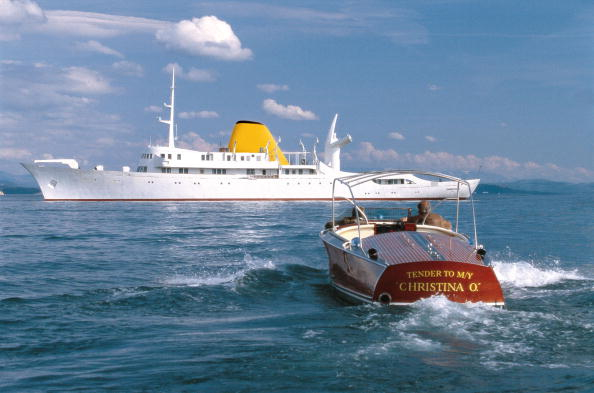
393657 01: (File Photo) The Newly Restored Christina O, Former Private Yacht Of Aristotle Onassis, And Her Tender Cruise At Sea April 24, 2001 In The Mediterranean. The Yacht Has Been Relaunched And Will Be Sailed By Tauck World Discovery And Titan Brokerage Corporation In The Spring/Summer 2001. (Photo By Getty Images)
Fancy an endless summer, cruising the Caribbean in winter and the Med in summer? Perhaps you’d like to work aboard a yacht that’s bigger than your dad’s house and help those with money to spare enjoy their lives to the full? One way to do this is to get your professional endorsements on your country’s leisure sailing qualifications, and become crew or skipper on a luxury yacht.
This article will look at what’s required for you to enjoy a life at sea for a living…
The first thing to consider is whether you enjoy sailing on the sea in all its moods? It is all well and good thinking sailing’s great because of an afternoon’s reaching in 15mph winds on a sunny day.
What about a Force 8 on the nose in short, confused seas on Biscay at midnight? The two are polar opposites, and honestly after a week on a yacht delivery across the Bay of Biscay I turned my back on the sea for nearly 10 years.
It isn’t just the rough seas and strong winds – the night that sticks out was when we encountered a very large ship that came far too close to us despite the crew doing everything to make plain that we were nearby. They finally got the message when we shone a sun lamp on our mainsail, having ignored our bloody radio messages for 15 minutes of building terror. It is the only time I have had to get the crew out of bed while they were off watch on a yacht. After setting foot on the dock, I threw two fingers up at Neptune and resolved only to ever sail dinghies.
Whether to skipper a powerboat or to crew a luxury yacht, many leisure qualifications can be commercially endorsed. Have a look at the RYA and IYT websites for information as to what certification you can get that can be turned into professional qualifications.
If you want to follow a structured career path into professional cruising yachting it is well worth looking at the IYT system, as it has a large number of certificates designed to help you progress through the ranks at a steady pace. Looking at the RYA by comparison, there are relatively few professional qualifications to be had.
With any professional qualification you must conform to the international Standards for Training and Certification for Watchkeeping (STCW) at sea. There are generally four certificates that you need to pass in order to become a professional sailor:
VHF – You need to have a VHF Short Range Certificate (SRC)
First Aid – you need an up to date maritime-geared First Aid Certificate
Fire fighting – you need fire fighting training
Sea survival – this takes around a week learning everything from how to launch a life raft as well as operating it in rough seas, to using lifesaving gear including the lifejacket and immersion suit.
Professional Practices and Responsibilities – this is required to show you how commands are given as well as the customs and protocols associated with living aboard at sea.
Upon presenting these certificates, alongside a health certificate (see below), you can get a professional qualification.
The main reason I write about sailing and am not a professional seafarer is that I had no chance at all of passing any professional qualifications due to my very poor eyesight as a youngster. Now I have had an operation to fix my bad eyesight, I have another problem – I’m on a medication for the rest of my life that may “reduce my performance or alertness” meaning I still can’t be a professional crew member!
International regulations on the basic fitness requirements for a professional yachtsman are the same as those for any merchant naval certification. Put simply, how would you feel if the guy on watch on your ferry from Dover to Calais on a gloomy night lost his glasses and couldn’t see past his nose, let alone the 250,000 tonne supertanker bearing down on him en route from the Persian Gulf to Rotterdam?!
You must get an ML5 or ENG1 medical certificate before you apply for a commercial endorsement or go for a professional qualification. The best website that covers all the restrictions is the UK government website – have a look at it here.
Most professional certificates are accepted all over the world. For example, where the RYA Day Skipper may well be accepted by a Spanish water policeman on a good day (but not always), a commercially endorsed Day Skipper will be recognised by the Spanish authorities in law, as it meets internationally recognised minima.
With these qualifications, you can begin your career at sea. As I’ve discussed, it isn’t all a bed of roses. The sea however is beguiling, and could provide you with a career that is both extremely rewarding and as far away from being a slave in an office as can possibly be…